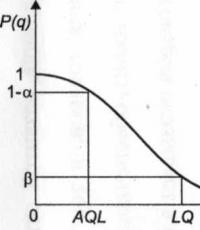What is the shipping basis? Choice of supply basis. Electronic communications in Incoterms
1. Introduction
2. Definition of the concept " Basic conditions supply of goods"
3 . Brief description of sections of "Incoterms-2000"
4. Conclusion
5. List of used literature
Introduction.
Foreign economic activity is part of the economic activity of any company, arising with the latter’s entry into the foreign market and its involvement in international economic relations.
The effectiveness of foreign economic activity depends on the correct drafting of foreign trade contracts, determination of prices, delivery conditions, calculation of customs duties, knowledge of the basics of international payments and international transport.
In various types of international contracts, especially in international sales contracts, a special place belongs to the basic terms of delivery.
Basic delivery conditions are called, firstly, because they are the base (basis) that determines the content of the foreign trade price depending on the distribution of transport costs for delivering the goods between the Seller and the Buyer (since the Seller’s expenses are included in the price of the goods), and, secondly , because they regulate a number of the most important, fundamental, basic issues related to organizing the delivery of goods to their destination.
In connection with its second function, any delivery basis regulates three key “transport” issues, without which the delivery of goods to their destination cannot be carried out. This:
1. Distribution between the Seller and the Buyer of transportation costs for the delivery of goods (that is, determining which costs are borne by the Seller and until when, and which, from what point onwards, are borne by the Buyer).
2. Moment of transition from Seller to Buyer:
a) risks of damage, loss or accidental destruction of the cargo;
b) ownership rights to the goods.
3. The date of delivery of the goods (that is, determining the moment of the actual transfer by the Seller of the goods to the disposal of the Buyer or his representative - for example, a transport organization - and, therefore, the fulfillment or failure of the former to fulfill its obligations regarding the delivery time).
All over the world it is customary to determine the basic conditions using the terms “Incoterms” developed by the International Chamber of Commerce.
The need for such a document was caused by the ambiguous interpretation of trade terms in different countries, which led to disagreements and disputes that had to be resolved through the courts. Therefore, the International Chamber of Commerce, based on a generalization of trade practice in different countries, unified these terms and issued in 1936 international rules for the interpretation of trade terms called “Incoterms 1936”.
This document was amended and supplemented in 1953, 1967, 1976 and 1980. Then came new edition document "Incoterms 1990". Currently it is in force in the 2000 edition - “Incoterms 2000”
Incoterms (International Commercial Terms) are:
1) international trade terms;
2) a set of unified international rules for the interpretation of trade terms, published by the International Chamber of Commerce (ICC) of Paris. Contains provisions regulating such important issues in international trade as the distribution of costs between the parties, determining the moment of transfer of the risk of accidental loss or damage to goods from the seller to the buyer, assigning the obligation to conclude a contract of carriage and an insurance contract, the procedure for notification and proof of delivery, obtaining licenses, compliance other requirements and formalities.
Definition of the concept “Basic conditions for the supply of goods.”
Basic terms of supply are the terms of contracts for the international purchase and sale of goods. Regulate the rights and obligations of the seller and buyer related to the delivery of goods: packaging, customs clearance, insurance, obtaining export and import permits, payment of loading and unloading costs, transfer of goods to the buyer. They also contain information on the procedure for completing the relevant documents. Basic terms of delivery serve as the basis for determining the price of the goods and the moment the seller fulfills the obligation to transfer the goods to the buyer and, accordingly, the risk of accidental loss or damage to the goods transfers from the seller to the buyer.
In the practice of international trade, the most frequently repeated combinations of obligations of sellers and buyers have been identified, which have come to be considered as international trade customs. This made it possible to unify part of the terms of contracts for the international purchase and sale of goods related to their supply. The International Chamber of Commerce of Paris publishes collections containing a set of rules for the uniform interpretation of basic terms (Incoterms), which have wide practical application.
Brief description of the sections of "Incoterms-2000".
"Incoterms-2000" contains an interpretation of 13 basic delivery conditions, arranged sequentially one after another according to the principle of increasing costs and responsibility of the Seller for the delivery of goods, that is, from its lowest costs and responsibilities (delivery condition "ExWorks" - "from the factory") to expenses and responsibilities of the greatest, maximum (condition "DDP" - "delivery with payment of duty", that is, "delivery fully paid"). In Incoterms 2000, basic delivery conditions are grouped into four categories. The first letter of the term that denotes this group is used as an indicator of each group: E; F; C and D.
Group E - departure, i.e. the seller makes the goods available to the buyer at his premises;
Group F - main freight not paid, i.e. the seller places the goods at the disposal of the first carrier specified by the buyer and chartered by him;
Group C - main freight paid, i.e. the seller enters into a contract of carriage and places the goods at the disposal of the carrier;
Group D - arrival, i.e. The seller enters into a contract of carriage and places the goods at the disposal of the buyer at the agreed destination, with or without payment of duty.
Let's look at a brief summary of each group.
Group E - departure:
1. From the factory (from the enterprise, from the mine, from the warehouse) (...at a named place)
EXW - Ex Works (... named place)
Under this basic condition, the seller has no obligation to transport the goods. The seller fulfills his obligation to deliver when he makes the goods available to the buyer at his premises (for example, a factory, enterprise, warehouse, etc.), at a named place and at the time specified in the contract. The seller is not responsible for loading the goods onto a vehicle provided by the buyer and for clearing the goods for export, unless otherwise provided in the contract.
The buyer bears all costs and risks arising from the moment of acceptance of the goods at the named place from the seller’s premises within the period stipulated in the contract, provided that the goods are properly individualized, i.e. is the subject of this particular agreement.
This condition provides for the minimum obligations to be fulfilled by the seller. It should not apply if the buyer is unable, directly or indirectly, to comply with export formalities. In such cases, it is possible to apply the condition “free from the carrier (... at a named place).”
Delivery of goods can be carried out either using various types transport in their combination, and any one type of ground transport.
Group F - main carriage not paid for:
2. Available from the carrier (... at a named place)
FCA - Free Carrier (... named place)
The seller under this basic condition fulfills his obligation to deliver the goods when he places the goods, cleared for export, at the disposal of the carrier nominated by the buyer at the named place or point. If the exact point is not specified by the buyer, the seller may choose the place of delivery within the specified territory, where the carrier will take the goods into his possession. Usually, according to established practice, the point that is closest to the main international transport routes is selected. This may be an inland point in the country of departure, a seaport, or a carrier's cargo terminal. As documents confirming the transfer of goods to the carrier, the seller, in accordance with this basic condition, must present a bill of lading, invoice or receipt from the carrier.
The buyer must promptly indicate the destination and pay the freight charge.
By carrier we should mean any person who, under a contract of carriage concluded with the buyer, carries out or ensures the performance of transport by rail, road, sea, air, inland waterway transport or a combination of such modes of transport.
The carrier assumes responsibility for transportation. He himself enters into a contract of carriage with the owners of vehicles (contract of road, rail, air, sea or multimodal transportation) or the contract is concluded on his behalf. A forwarding company that assumes responsibility for transportation can also be considered a carrier.
If the buyer instructs the seller to deliver the goods to a person or freight forwarding firm other than the carrier, the seller is deemed to have fulfilled his obligation to deliver the goods when they are in the possession of such person or firm.
The term "transport terminal" means a railway terminal, a freight railway station, a container terminal or marshalling yard, a light commercial cargo terminal or a firm.
The term "container" includes any equipment used to form consignments, i.e. all types of containers or platforms, trailers, roll-on loading equipment and other devices for all types of transportation.
3. Free along the side of the vessel (... at the named port of shipment)
FAS - Free Alongside Ship (...named port of shipment)
Under this basic condition, the seller is obliged to deliver the goods at his own expense to the port of loading specified in the contract, at the place specified by the buyer, within the agreed time and place the goods along the side of the ship chartered by the buyer.
If the vessel, due to its size or deep draft, cannot load at the berth and loading takes place in the roadstead, the seller is obliged, at his own expense and risk, to deliver the goods on lighters (self-propelled barges) or other auxiliary means to the side of the vessel and notify the buyer about this.
Under this condition, the buyer is obliged to charter the ship in a timely manner, inform the seller in advance of its name, time of arrival, loading conditions and bear all costs for delivering the goods to the ship. The risk of accidental loss or damage to the goods passes from the seller to the buyer at the time of actual delivery of the goods along the side of the vessel at the designated port of loading within the agreed period.
The seller can provide an additional service to the buyer: book a place for transportation on a liner vessel. A liner vessel serves liner shipping, which is a form of regular shipping that ensures the direction of transportation with stable passenger and cargo flows and provides for the organization of the movement of ships assigned to the line according to a schedule with payment at a tariff.
In this case, the buyer must reimburse the seller for expenses (in particular, for issuing a bill of lading for the cargo accepted for shipment).
The buyer is responsible for clearing the goods for export. This condition shall not apply where the buyer is unable, directly or indirectly, to comply with export formalities. It should not be forgotten that these responsibilities are assigned to the buyer if the participants in the foreign economic transaction are guided by the basic conditions of Incoterms - 90. If Incoterms 2000 is used, the seller must clear the goods for export.
The FAS condition can only be applied to sea or inland waterway transport.
Providing for the distribution between the seller and the buyer of responsibilities for promoting the goods, preparing the relevant documents and paying transportation costs, determining the moment of transfer from the seller to the buyer of ownership of the goods, the risk of accidental damage or loss of the goods, as well as the delivery date.
Large legal dictionary. - M.: Infra-M. A. Ya. Sukharev, V. E. Krutskikh, A. Ya. Sukharev. 2003 .
See what “DELIVERY BASIS” is in other dictionaries:
A condition of a foreign trade transaction that distributes between the seller and the buyer the obligations for drawing up transaction documents and paying transportation costs, determining the moment of transfer of ownership of the goods from the seller to the buyer,... ... Dictionary of business terms
Conditions of a foreign trade transaction relating to the distribution of responsibilities between the seller and the buyer regarding the preparation of documents, distribution of costs, meeting delivery deadlines, etc. Raizberg B.A., Lozovsky L.Sh., Starodubtseva E.B..… … Economic dictionary
SUPPLY BASIS- conditions of a foreign trade transaction relating to the distribution of responsibilities between the seller and the buyer regarding the preparation of documents, distribution of costs, fulfillment of delivery deadlines, determination of the moment of transfer of rights from the seller to the buyer... Legal encyclopedia
Conditions of a foreign trade transaction concerning the distribution of responsibilities between the seller and the buyer regarding the preparation of documents, distribution of costs, fulfillment of delivery deadlines, determination of the moment of transfer of rights from the seller to the buyer...
delivery basis- a condition of a foreign trade transaction, providing for the distribution of responsibilities between the seller and the buyer for the promotion of goods, execution of relevant documents and payment of transportation costs, determination of the moment of transition from the seller to... ... Large legal dictionary
SUPPLY BASIS- a condition of a foreign trade transaction, providing for the distribution of responsibilities between the seller and the buyer for promoting the goods, execution of relevant documents and payment of transportation costs, determining the moment of transition from the seller to... ... Large economic dictionary
delivery basis- conditions of a foreign trade transaction relating to the distribution of responsibilities between the seller and the buyer regarding the preparation of documents, distribution of costs, meeting delivery deadlines, etc.... Dictionary economic terms
- (see DELIVERY BASIS) ... Encyclopedic Dictionary of Economics and Law
- (Greek basis) a premium to an exchange quote or a discount from it, which is the subject of bargaining. It depends on the type and quality of the goods, delivery conditions, payments and other factors. The increasing basis is indicated in points upward from the stock quote,... ... Economic dictionary
From Greek ba sis A. Basis, foundation, base. B. A premium or discount to an exchange quote. It is subject to negotiation and depends on the quality of the goods, delivery conditions, payment terms and other factors. B. can be increasing or decreasing. Dictionary … Dictionary of business terms
Shipping basis
1. The price tables contain the following column:The shipping basis is the location from which the product will be delivered.
2. C The price indicated in the table is the price in this place (on the basis of shipment).
3. Delivery to the buyer is calculated individually based on the region of delivery.
Delivery basis
When concluding a purchase and sale agreement, the parties, along with other conditions, must agree and fix the basis for the supply of goods.
The delivery basis sets:
Responsibilities of the Seller for the delivery of goods;
The moment of transfer of risks of damage and loss of goods from the Seller to the Buyer;
Distribution of costs for transportation, transshipment, insurance and customs clearance of goods between the Seller and the Buyer.
There is a difference between shipping contracts and delivery contracts. In the first case, the Seller transfers the goods to the Buyer at the specified point (or port) in the country of departure. In the second case, the Seller transfers the goods to the Buyer at the agreed port or point in the country of destination. Until this moment, he bears the risk of damage or loss of goods. Shipping contracts, as a rule, meet the interests of both parties to the transaction
Quantity and quality of value, their cost, place of execution of the contract (delivery basis), terms of its execution, terms of payment, guarantees, packaging and labeling and other necessary details.
Terms and phrases in the dictionary are arranged in strictly alphabetical order. After each term (phrase), as a rule, its equivalent is given in English language. In the text of dictionary entries, the main term is designated initial letters. To facilitate the use of the dictionary and increase its information content, where necessary, references are used by marking - (see). At the end of the dictionary there is an alphabetical index of English terms with equivalents in Russian and the pages where they are located. In addition to the dictionary, a table is given commercial concepts to indicate the conditions (basis) for the delivery of goods in accordance with the international rules of Incoterms.
COMMERCIAL TERMS to indicate the conditions (basis) for the supply of goods (given in accordance with international rules of interpretation)
In Western countries, for example, traditional partners do not impose formal requirements for such a document as a buyer’s request for a product, so the course discusses a request option that is equally applicable in both Russian and international markets. The terms of delivery and payment in foreign trade contracts are usually more complex than in transactions in domestic markets, so the course examines the basis of delivery and payments used in foreign trade. In a number of cases, when concepts that sound identical in Russian and international law, for example, “trading agent” or “irrevocable letter of credit,” are interpreted differently, both interpretations are considered.
Justify the supply basis.
The goods are at the port of departure. You, the Exporter, choose the delivery basis for inclusion in the offer with the least responsibility for the fate of the goods.
Explain your approach to choosing a supply basis.
In the “Price” section of the contract, the nominal price or the procedure for determining it is fixed, and the delivery basis is also indicated here, since the price as a monetary expression of the value of the goods will be different for different delivery conditions.
In foreign trade practice, prices calculated using the above methods are indicated in combination with the delivery basis, usually in Incoterms 2000 terminology.
In table Figure 9 shows a diagram of the formation of the retail price for a product from the moment of its production, then shows the influence of transport and other costs on various delivery bases and, finally, the costs of selling the product to the final buyer. For a more complete picture of the importer's costs, table. Figure 10 shows sample costing items.
Commercial terms a) price b) delivery basis c) exchange rate, etc.
Introduction of amendments to commercial terms 1) delivery basis 2) payment terms 3) delivery terms 4) currency adjustments 5) trade discounts, etc.
Works out with the Contractor the transport terms of purchase and sale contracts with foreign companies and concludes them on the delivery basis agreed upon with the Contractor.
Incoterms do not regulate the moment of transfer of ownership, and the laws of different countries regulate it differently. The contract does not establish such regulation, which may cause disputes. Individual Incoterms conditions can also be included in a contract without a general reference to the Rules. Incoterms should be distinguished from another ICC publication, Commercial Terms (No. 16, 1953), which contains information about trade customs interpreting contractual terms determining the basis of delivery. For use trade custom reference to it in the contract is not required.
If in the terms of delivery for any item the seller or buyer has “no obligations”, then any of these parties can fulfill certain obligations of the counterparty on his instructions and at his expense, but nevertheless these procedures are not obligations arising from from the delivery basis.
The price in the contract is indicated in monetary units of a certain currency per quantitative unit on an agreed delivery basis. In this case, the parties stipulate how the established price is understood, i.e. whether it includes the costs associated with sending the goods, for containers, packaging, labeling, etc.
An adjustment to the delivery basis factor is made in cases where the basis diverges from what is desired and accepted for price calculations. The adjustment is made by adding or subtracting freight and/or insurance costs from the price. Import prices usually lead to delivery terms of "CIF Russian port" or "free-border", and export prices - "FOB Russian port" or "free-border".
The name of the point of departure for EXW and group F delivery bases and the destination when concluding a contract on the terms of groups C and D.
The acquisition of transferable guarantees and guarantees for sale listed on the exchange presupposes, firstly (and this is the most effective measure), the acquisition of those previously recorded on the exchange received by someone from interested buyers (customers) of this product letters of guarantee, in which they undertake, subject to compliance with the agreed conditions on price, quantity, configuration and quality of the product, delivery basis (acceptance by the seller of a certain version of standard obligations related to transportation, insurance, customs clearance and circumstances of acceptance of the goods), etc. purchase the company's product by the appointed date. The exchange may organize specialized quotation and trading of such guarantees.
The last circumstance in the contract can be regulated both in the standard delivery basis (if it is applied) and specifically, additionally. This can be done in any case, even if this duplicates the generally accepted terms of the international standard delivery basis already included in the contract.
For air transportation, deliveries are made free of charge at the place of delivery of the goods for transportation by air transport organization in the Seller's country. The delivery basis is provided in accordance with the established practice of relations between air fleet organizations and clients, since after delivery of the goods the shipper is deprived of the opportunity to control the activities of the air fleet organization in sending cargo.
The foreign partner, in accordance with the contract, supplied the necessary raw materials at the agreed time. The contract specified the delivery basis - CIF Moscow. The exchange rate on the day of customs clearance was 4,580 rubles. Thus, the customs value of raw materials amounted to 458,000,000 rubles.
The choice of delivery basis FOB, CIF, ex-carriage - border, etc. is agreed upon by the buyer and seller.
According to the contract, the scope of the ordered equipment is clearly defined, and we do not understand why your representatives insist that we must supply, if necessary, additional equipment at our own expense, if this is not included in the contract price. Moreover, this will lead to a change in the supply basis, since urgent delivery during installation is necessary by plane or road transport, which will entail an increase in price.
The delivery specification is not able to exhaustively list all components, mechanisms and individual parts to be supplied. We buy machines as a set, and it is in your interests to ship the entire lines on time, so as not to incur additional costs for immediate delivery and changing the delivery basis.
EXPORT PRICE CALCULATION (export pri e al ulation) is an internal document drawn up in a foreign trade enterprise to justify the effectiveness of the planned export operation. It indicates





